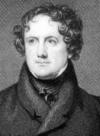- Biddle, Nicholas
-
born Jan. 8, 1786, Philadelphia, Pa., U.S.died Feb. 27, 1844, PhiladelphiaU.S. author, financier, and lawyer.He served as secretary to Pres. James Monroe (1806–07), then minister to England, and, afterward, while practicing law in the U.S., he wrote History of the Expedition of Captains Lewis and Clark (1814) from the explorers' notes. In 1823 Monroe appointed him president of the Second Bank of the United States. He developed the bank into the first effective U.S. central bank, sponsoring policies that curbed credit, regulated the money supply, and safeguarded government deposits. In 1832 the bank came under attack from Pres. Andrew Jackson, who managed to terminate its national charter in 1836. Biddle later became president of the bank under a Pennsylvania state charter. The Federal Reserve System was later established as the country's central bank.
 Nicholas BiddleBy courtesy of the Library of Congress, Washington, D.C.
Nicholas BiddleBy courtesy of the Library of Congress, Washington, D.C.* * *
▪ American financierborn Jan. 8, 1786, Philadelphiadied Feb. 27, 1844, Philadelphiafinancier who as president of the Second Bank of the United States (1823–36) made it the first effective central bank in U.S. history. He was Pres. Andrew Jackson's chief antagonist in a conflict (1832–36) that resulted in termination of the bank.Biddle was a contributor to and later (1812) editor of Port Folio, the first U.S. literary journal. He served as secretary to Pres. James Monroe (1806–07), then minister to England, and, afterward, while practicing law in the United States, he wrote History of the Expedition of Captains Lewis and Clark (1814) from the explorers' notes. In 1815, while a member (1814–18) of the state senate, Biddle drafted and wrote Pennsylvania's rejection of the Hartford Convention's proposed constitutional amendments to limit the powers of Congress and of the executive. In 1819 President Monroe commissioned him to compile a digest of foreign legislation affecting U.S. trade and appointed him one of the directors of the Second Bank of the United States.As president of the bank, Biddle sponsored policies that restrained the supply of credit to the country's banks; stabilized the investment, money, and discount markets; regulated the money supply; and safeguarded government deposits. Between 1832 and 1836 the bank came under the attack of Jackson's Democratic Party, which sought to eliminate it, while the Whigs supported it. After Jackson won termination of the bank's national charter in 1836, Biddle became president of the rechartered Bank of the United States of Pennsylvania. After retiring in 1839, Biddle helped to establish Girard College in Philadelphia and held celebrated literary salons at Andalusia, his country estate.* * *
Universalium. 2010.
